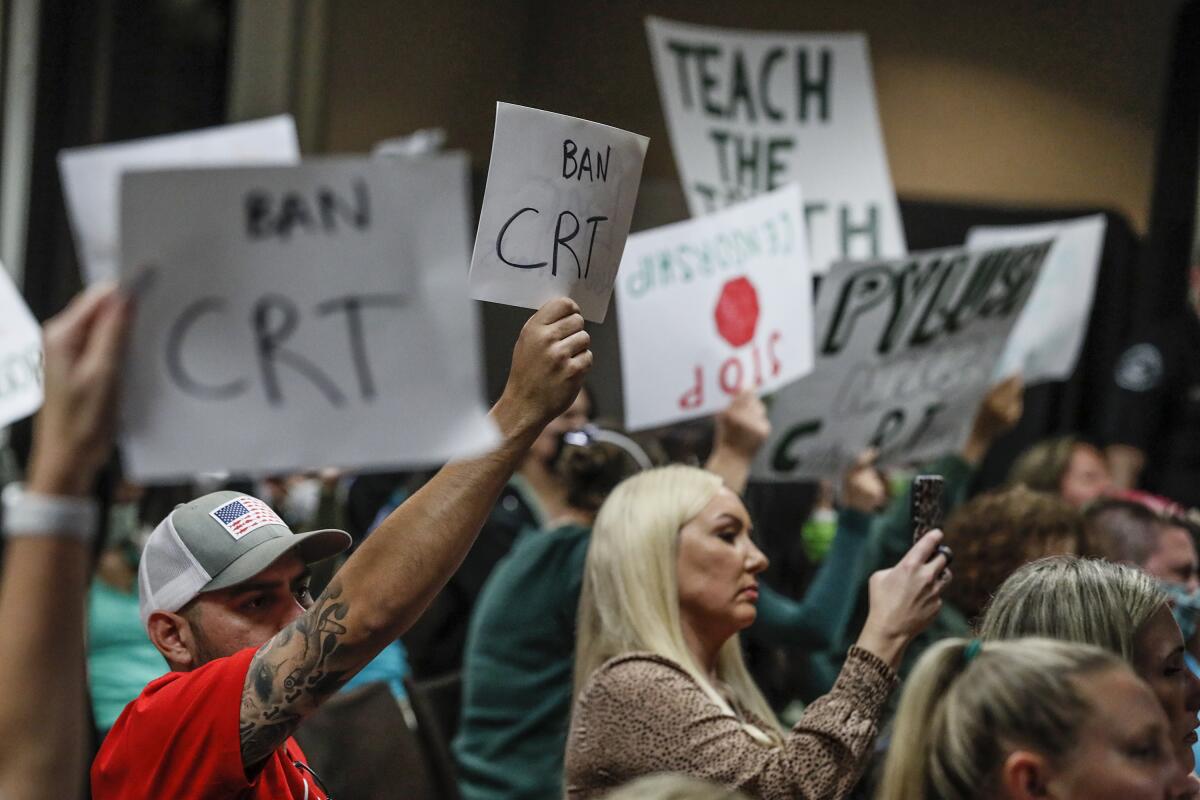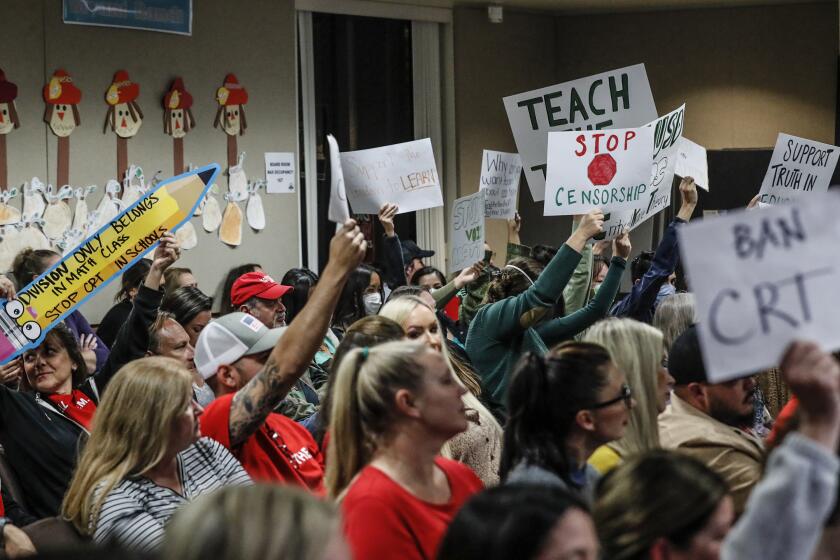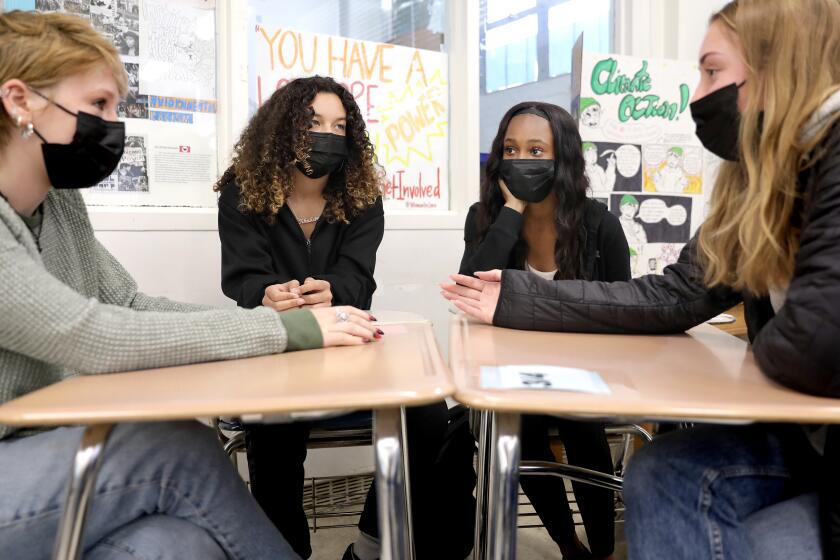After O.C. school district bans critical race theory, it faces Cal State Fullerton backlash

- Share via
Months after an Orange County school district banned teaching critical race theory, Cal State Fullerton has told school officials it is pausing placement of its student teachers in the system’s K-12 classrooms, citing concerns that district policies conflict with university goals that promote equity and inclusion in education.
Leaders in the university’s College of Education — among the biggest providers of teachers into the county’s public schools — told officials in the Placentia-Yorba Linda Unified School District that they did not believe the district would be able to support its student teachers whose training is rooted in diversity, equity, inclusion, social justice and tenets of critical race theory, according to a statement from Lisa Kirtman, dean of the College of Education, and the college’s leadership.
“Clinical practicums, fieldwork and student teaching are major components of effective teacher preparation,” the statement said. “It is critical that we place teacher candidates in districts that support their growth and development.”
The college is open to working with the district to provide learning experiences that value “freedom of thought and expression” for the diverse student population.
Kirtman declined to comment. In an email, a university spokesperson said “the situation is still unfolding.”
Six student teachers from Cal State Fullerton are working in the Placentia-Yorba Linda district this academic year, down from the 70 or 80 who have typically been placed in the system.
In a second statement, leaders in the College of Education said the pause would begin in the spring. Student teachers reported it was unclear from teachers in the district if they could “teach curriculum related to ethnic and cultural differences” that are included in state standards for teacher preparation.
District Supt. Michael Matthews, in a message to families, said leaders in Cal State Fullerton’s College of Education asked the district over the summer about its commitment to “providing a just, equitable and inclusive education” after the school board narrowly approved a measure in April banning the teaching of critical race theory.
An Orange County school district’s debate over critical race theory exemplifies how a hard-to-define academic concept has become a proxy for uncomfortable conversations about racial injustice in the U.S.
The resolution, which passed 3 to 2, encourages culturally relevant instruction and states the district “values all students and promotes equity and equality.” But it also says the district will “not allow the use of critical race theory as a framework to guide such efforts” and that “other similar frameworks” cannot be used to guide teachings on race.
Cal State Fullerton sent a letter to the 24,300-student district at the time, discouraging the move, according to a school board member who read a portion of the letter at a public meeting. Another school board member read aloud another part of the letter in which the university said it is proud its students “come to you with the education to effectively explain and include CRT, as well as ethnic studies in their classrooms.”
School board member Marilyn Anderson said the university statement bolstered her support of the resolution banning critical race theory, saying, “it is important to pass because our teachers are coming into our district learning these principles and how to incorporate them in a K-12 setting. This is not imagination.”
It is not clear whether educators in the Placentia-Yorba Linda district have ever taught lessons on critical race theory, a university-level academic framework that seeks to examine how racial inequality and racism are embedded in legal systems, policies and institutions in America.
But Republican activists and lawmakers have denigrated the academic theory in recent years as part of their drive to restrict how race and racism are taught in public schools.
School board member Leandra Blades, a key supporter of the district’s critical race theory ban, said Cal State Fullerton’s decision validates her April vote.
“I look forward to seeing what colleges and universities we can partner with in the coming months,” Blades said in a statement. “The only students being harmed by this political stance [are] the student teachers at CSUF.”
In his message to families, Matthews said the school district assured the college it would provide a “just, equitable, and inclusive education for all students.”
“We are disappointed by their decision to pause the placement of new student teachers in our district,” he said. “We value our partnership with CSUF, and we look forward to continuing the discussion about renewing their placement of student teachers in PYLUSD.”
Ethnic studies is now required for future graduating California high school students. A look inside what students talk about in ethnic studies classes.
Teacher candidates at Cal State Fullerton participate in 150 hours of fieldwork during their first semester of student teaching, and 450 hours during their second semester, according to the college’s website. The university partners with 14 school districts to place student teachers.
Linda Manion, president of the Assn. of Placentia-Linda Educators, an alliance that represents 1,100 educators, said many new hires in the district graduate from Cal State Fullerton. She worries the district will lose out on prospective teachers in the midst of a national teacher shortage.
“Cal State Fullerton is our lifeblood. They really are a lifeline for our district,” she said. “When we don’t have that pipeline of new teachers coming in, those teachers are going to go to other districts around us.”
Other colleges in the area place student teachers in Placentia-Yorba Linda, but most come from Cal State Fullerton, Manion said.
In a statement, the Placentia-Yorba Linda Unified School District said Cal State Fullerton is the only university to halt student teacher placements in the system.
“Our school district now has a larger capacity to accept student teacher placement requests from other universities,” the statement said. “We appreciate the opportunity to meet and train high-quality teachers.”
Some teachers and parents in the district worry that the lack of extra help from student teachers will harm classrooms at a time when many students are focusing on academic recovery and need extra attention.
One teacher, who spoke on condition of anonymity for fear of political backlash, said teachers are already stretched thin and the removal of student teachers increases their workload.
Student teachers typically spend a couple of weeks observing a classroom before transitioning to running the classroom under the guidance of a regular teacher.
“I was supposed to get a student teacher this semester but I didn’t,” the teacher said. “Now we can’t teach the teachers of tomorrow.”
Alex Siemons, a parent of two high school students in the district, said his daughter benefited from having two Cal State Fullerton student teachers in her orchestra class last year.
“It has a direct impact on the ability to teach kids in our district,” he said, adding he views the decision by Cal State Fullerton as a censure of the ban on critical race theory in the district. “The outcome of what happened is hurting kids, teachers, student teachers.”
Critical race theory remains a key issue in next month’s school board elections. Carrie Buck and Karin Freeman — the two board members who voted against the April resolution — are up for reelection.
Their challengers are opposed to critical race theory and are endorsed by the Republican Party of Orange County and two other school board members.
Times staff writer Melissa Gomez contributed to this story.
More to Read
Sign up for Essential California
The most important California stories and recommendations in your inbox every morning.
You may occasionally receive promotional content from the Los Angeles Times.

















